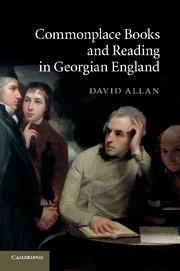Book contents
- Frontmatter
- Contents
- List of abbreviations
- Acknowledgements
- PROLEGOMENON
- PART I ORIGINS
- PART II FORM AND MATTER
- 5 ‘A sort of register or orderly collection of things’: Locke and the organisation of wisdom
- 6 The importance of being epigrammatic
- 7 Manufacturing an encyclopaedia
- PART III READERS AND READING
- PART IV ANCIENT AND MODERN
- PART V TEXTS AND TASTES
- PART VI ANATOMISING THE SELF
- ENVOI
- Bibliography
- Index
5 - ‘A sort of register or orderly collection of things’: Locke and the organisation of wisdom
Published online by Cambridge University Press: 03 May 2011
- Frontmatter
- Contents
- List of abbreviations
- Acknowledgements
- PROLEGOMENON
- PART I ORIGINS
- PART II FORM AND MATTER
- 5 ‘A sort of register or orderly collection of things’: Locke and the organisation of wisdom
- 6 The importance of being epigrammatic
- 7 Manufacturing an encyclopaedia
- PART III READERS AND READING
- PART IV ANCIENT AND MODERN
- PART V TEXTS AND TASTES
- PART VI ANATOMISING THE SELF
- ENVOI
- Bibliography
- Index
Summary
Quotations must be plentifully gathered, and bookt in Alphabet …
Jonathan Swift, A Tale of a Tub (1710)That reading's greatest benefit might be that it confers possession of the wisdom lying latent within texts is an idea almost as old as writing itself: ‘We take the opinions and the knowledge of others into our keeping’, as Montaigne himself suggested of this well-intentioned and ordinarily beneficial act of appropriation. On precisely the same reasoning, however, modern readers enjoy an especially privileged position. For the very business of consuming texts makes them the fortunate new owners of the aggregated experiences of all earlier times. This seductive notion was vividly captured in A Brief Method of the Law (1680). Books, its anonymous author claimed, had originated with ‘a desire that our Ancient Fore-fathers had to instill into their Posterity the Wisdom of their long Experiences, after they themselves were laid in the Dust, and were no longer capable of being living Masters to them’. The same thought seems to have appealed strongly to another thoughtful scholar a hundred years later.
- Type
- Chapter
- Information
- Commonplace Books and Reading in Georgian England , pp. 61 - 70Publisher: Cambridge University PressPrint publication year: 2010



